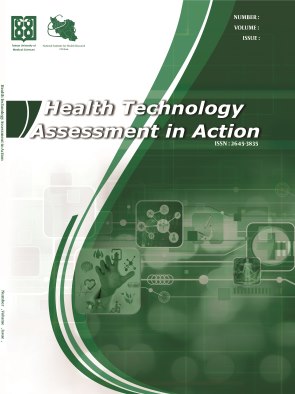Analyzing, Prioritizing, and Presenting the Model of Core Competencies of Education Managers
Abstract
Background: Today, with the advancement of science and technology, societies are becoming more complex and specialized. Therefore,
knowledge should be considered the foundation of the development and social welfare of countries.
Objectives: The present study aimed to examine the role of three managerial skills in designing the competence model of education managers of Islamic Azad Universities in Khorasan Razavi.
Methods: This research is applied in terms of purpose and exploratory mix (qualitative-quantitative) in terms of method. The measurement instrument in the qualitative part was a semi-structured interview, and in the quantitative part, it consisted of a researcher-made questionnaire. The statistical population included 951 employees of the Islamic Azad University of Razavi Khorasan, of which 274 were randomly selected. For data analysis, the Delphi technique was employed in the qualitative part, and the structural equation modeling method of SPSS22 and AMOS26 software was used in the quantitative part.
Results: It was found that 75% of managers’ competence depends on the dimensions of managerial skills (technical, human, perceptual). These dimensions can explain and predict the competence of education managers, including individual characteristics, organizational factors, entrepreneurial competence, business competence, leadership, decision-making, and cooperation.
Conclusions: According to the results of this study, it is required to develop a long-term and operational strategic roadmap and program with a paradigmatic approach and a local and regional view.
2. Mousavi F, Vashani A, Saeidipour Z. [Investigating the level of compliance with professional ethics standards of second secondary school principals in Sanghar city]. Educational Leadership & Administration. 2016;10(2):97-122. Persian.
3. Aghighi AZ. [Relationship between Some Ethical Variables on Organizational Health]. Ethics in Science and Technology. 2017;11(3):97-107. Persian.
4. Shafipour SF, Zare Zaidi AZ, Matani M. [The role of managers’ professional ethics in the success of organizations]. Applied Studies in Management and Development Sciences. 2018;2(5):38-48. Persian.
5. Sabokroo M, Behrad A, Tabataba’i-Nasab SM. [Designing Competency Model for the Head of Tax groups at Iranian National Tax Administration Based on Qualitative Approach]. J Tax Res.2019;26(40):65-92. Persian.
6. Mousavi SA, Mohammadi M, Safian M. [Designing a Competency Model for Managers of Organizational Universities (Case Study: a University Affiliated with a Military Organization)]. Irainian Journal of Management in the Islamic University. 2021;9(20):217-40.Persian.
7. Amirkafi M, Hasheminasab F. [The effect of organizational justice, perceived organizational support and organizational trust on organizational commitment]. Social Problems of Iran. 2013;4(1):33-62. Persian.
8. 8. Eslamieh F, Mohammad Davoudi AH. [Evaluating elementary school principals’ level of professional qualifications and skills and its relationship with teachers’ job commitment and involvement]. Journal of Instruction and Evaluation. 2014;7(27):103-16. Persian.
9. Dziekoński K. Project Managers’ Competencies Model for Construction Industry in Poland. Procedia Eng. 2017;182:174-81. https://doi.org/10.1016/j.proeng.2017.03.157.
10. Mufti O, Parvaiz GS, Wahab M, Durrani M. Human Resource Competencies and Organizational Performance: A Study on Banking Sector Managers in Pakistan. J Manag Sci. 2016;10(1):83-104.
11. Wesselink R, Blok V, van Leur S, Lans T, Dentoni D. Individual competencies for managers engaged in corporate sustainable management practices. J Clean Prod. 2015;106:497-506. https://doi.org/10.1016/j.jclepro.2014.10.093.
12. Liikamaa K. Developing a Project Manager’s Competencies: A Collective View of the Most Important Competencies. Procedia Manuf. 2015;3:681-7. https://doi.org/10.1016/j.promfg.2015.07.305.
13. Asumeng MA, Osae-Larbi JA. Organization Development Models: A Critical Review and Implications for Creating Learning Organizations. Eur J Train Dev Stud. 2015;2(3):29-43.
14. Ekrami H, Hoshyar V. [The Competencies of High School Principals in District Four of Mashhad]. Quarterly Journal of Family and Research. 2016;13(3):7-32. Persian.
15. Kazemi Kia H, Ahmadi A, Ahghar Q. [Model design and validation of organizational growth]. Educational Leadership & Administration. 2018;12(3):225-41. Persian.
16. Pazhohan A. [Relationship organizational development with self-esteem and their dimensions at staff PNU, Kurdistan province]. Public Organizations Management. 2014;2(4):77-94. Persian.
17. Najarpor Ostadi S, Taghizadeh H. [Investigating the Relationship between Emotional Intelligence and Organizational Development among Staffs of Islamic Azad University of Shabestar]. Journal of New Approaches in Educational Administration. 2012;3(11):121-36. Persian
| Files | ||
| Issue | Vol 7, No 1 (2023) | |
| Section | Articles | |
| DOI | https://doi.org/10.18502/htaa.v7i1.13298 | |
| Keywords | ||
| Competencies The Competence of Managers Managerial Skills Islamic Azad University Branches | ||
| Rights and permissions | |

|
This work is licensed under a Creative Commons Attribution-NonCommercial 4.0 International License. |




